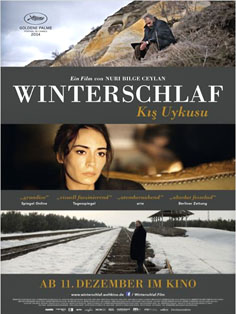
Turkey | France | Germany 2014
Starts December 11, 2014
Directed by: Nuri Bilge Ceylan
Writing credits: Nuri Bilge Ceylan, Ebru Ceylan
Cast: Haluk Bilginer, Melisa Sözen, Demet Akbag, Serhat Mustafa Kilic, Nejat Isler, Ayberk Pekcan, Tamer Levent, Nadir Aribacak
Length: 196 minutes  Set in the hills of Anatolia in east Turkey, this film revolves around the figure of Aydin (Bilginer), a handsome, elderly man and former actor, who runs a hotel catering to foreign visitors. You see him at the beginning of the movie in a long black coat, striding between beehive-like huts built into the cliffs that look like something out of the middle ages. Then you are led into one of the huts and are amazed to see how wealthy and civilized it is furnished with warm rugs, antique furniture, original paintings on the wall, and a shiny Apple computer on the desk. This is just one of the incongruities of this part of Turkey, which is open to modern communications and travellers but still heavily embedded in pre-modern living conditions. And Aydin is a kind of prism, through whom all these contradictions pass and are deflected. The first impression you have of him is that of an intelligent, sensitive and gentle man. But then, as in real life, you discover his ambiguities.
Set in the hills of Anatolia in east Turkey, this film revolves around the figure of Aydin (Bilginer), a handsome, elderly man and former actor, who runs a hotel catering to foreign visitors. You see him at the beginning of the movie in a long black coat, striding between beehive-like huts built into the cliffs that look like something out of the middle ages. Then you are led into one of the huts and are amazed to see how wealthy and civilized it is furnished with warm rugs, antique furniture, original paintings on the wall, and a shiny Apple computer on the desk. This is just one of the incongruities of this part of Turkey, which is open to modern communications and travellers but still heavily embedded in pre-modern living conditions. And Aydin is a kind of prism, through whom all these contradictions pass and are deflected. The first impression you have of him is that of an intelligent, sensitive and gentle man. But then, as in real life, you discover his ambiguities.
One obvious contradiction involves gender. Aydin is an educated, wealthy and elderly male, which give him superior rank and shape his role as a tolerant but basically detached patriarch. He supports two women, his beautiful young wife, Nihal (Sözen), and his recently divorced sister Necla (Akbag). Both women lead quite comfortable lives, which seem to be more important to them than greater independence, and both resent Aydin’s power. Another conflict is between poverty and wealth. Aydin derives his income from rental property he inherited from his father, and although he writes moralistic columns in the local newspaper, he is very unsentimental when it comes to collecting rent. He keeps his distance from the problem by letting his “henchman” Hidayet (Pekcan) do the dirty work. Then there is the clash between youth and mobility on the one hand and old age and a sedentary rural life on the other. Young visitors come and go, and Aydin likes talking to them, since he once had a more active life in Istanbul. But although he attempts at one point to return to Istanbul, he finds that he is unable to leave his wife and home in Anatolia. This is also symbolized by a wild horse that a kind of Turkish cowboy captures for Aydin, but which he releases in the end. Aydin escapes all these conflicts by constructing an alternate world through writing, which Necla refers to as “gooey romanticism.” In this world he is completely self-absorbed but content. We see him at the end of the movie declaring his love for his wife on his Apple computer, quite pleased with himself and at peace with his situation.
This movie is a long one (three hours), but the vast, exotic scenery and the highly sophisticated dialogs it employs to convey its message are well worth experiencing. ()
